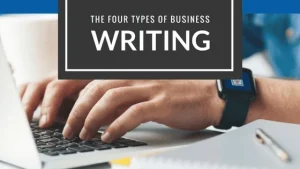Business Writing Essentials: Types, Principles and Effective Skills

Business writing is a skill that many professionals use on a daily basis. When it’s done right, business writing can be an invaluable tool for building your team, communicating with the public, generating sales leads and growing your existing customer base.
Some businesses don’t take the time to invest in good business writing skills, because they believe that their people are too busy, or that business writing isn’t required in their industry.
In this article I’ll explain why good business writing is not only essential but taking the time to master it is an excellent investment in your company.
This article will start by defining what business writing is (because there are some misconceptions out there), then discuss the four types of business writing, describe the four principles of good business writing, list some effective writing skills and highlight some common mistakes in business writing.
What is business writing and why does it matter?
Business writing is any form of written communication you send to an external or internal audience that relates to business. It includes: emails, memos, proposals, reports, blog posts, social media, quotes, invoices and more.
When it’s done well, business writing can be a powerful way for a business to express itself and relay information in a compelling manner. But when it’s done poorly, it can reduce efficiency, negatively impact the company’s reputation and even reduce sales.
Think of business writing as a form of marketing, not for any specific product or service but for the company itself. Whenever a business creates a good marketing campaign, a lot of thought goes into defining the sense of “brand” to be portrayed – is the company fun and trendy (appropriate to a clothing line) or is it knowledgeable and trustworthy (like a financial advisor)?
The marketing campaign will likely be focused on a specific product or service, but around it will be the brand of the company – the feel of the business.
What some business people forget, though, is that every communication needs to reflect this brand – not just the marketing. When a business issues its annual report, that report’s tone should match the corporate brand created in the marketing.
When a business has to issue a public statement, the writing should reflect that brand. Even internal documents like memos and, yes, email, should always try to be “on brand” – because you never know who might read it.
Okay, you might be saying right now, even emails have to be on brand? I would argue yes, for two reasons. First, emails can always be forwarded to clients or the media – anything said in them will potentially be read by outsiders.
Second, by training your team to apply good business writing principles to their everyday communications, they’ll be well-practiced for when they have to write “important” documents like proposals or reports. Getting folks into good business writing habits in their daily work strengthens your corporate communication level overall.
Good business writing at all levels sets the tone for your company. If you invest the time into training your team on how to create effective business documents, both internal and external customers will have greater trust in what you say.
They’ll recognize (perhaps subconsciously) the consistency of your company’s writing and this will build their comfort level with your business.
Good business writing gets its point across efficiently and effectively, and this will further solidify your corporate reputation as readers see how invested you are in making sure your message is clear.
On the other hand, simple things like bad grammar, poor sentence structure, inappropriate language (not necessarily offensive language but simply language that doesn’t match your company’s brand) will degrade the public’s trust in your business.
If this company can’t even take the time to write well, your potential customers may conclude, how can I trust them to deliver what they promise?
The four types of business writing

Even though business writing can appear in many formats, from annual general reports to emails, there are only four basic types of business writing, defined by the purpose behind them. The four types of business writing are:
Instructional
This is writing intended to teach something specific. Most commonly seen in help guides, technical manuals and textbooks, it has a reputation for being dry. But instructional business writing doesn’t have to be boring.
It can be fun, engaging and a pleasure to read – so long as it is clear. Bad instructional writing is most often considered dry and boring because it isn’t written in a way that’s easy to follow.
Good instructional writing, though, can be very specific and very detailed, but if it’s written in an engaging style, with the clear and logical building of steps, it can be a pleasure to read and – most importantly – make it easy for the reader to learn what you need them to learn.
Informational
This type of business writing is similar to Instructional in that its purpose is to teach the reader something. But Informational writing tends to be on broader subjects with a more general focus.
Whereas Instructional writing might focus on how to conduct basic checks of your hybrid car’s engine, Informational writing will talk about, say, the industry’s overall shift toward hybrid cars in general and why this is important.
Informational writing is important if your business exists in a complex industry. You’ll need to inform your reader of certain facts and trends in order to build the case for why your business is important and why potential clients should consider your products or services.
Persuasive
Persuasive business writing takes the concept of Informational business writing and goes one step further. Persuasive writing doesn’t just present information: it presents a hypothesis, or an argument, or a position, and then works to convince the reader to agree.
Persuasive writing is taking sides and building a case to convince others to join that side. It doesn’t have to be confrontational – and is often best when it isn’t – but it does have to get off the fence and clearly state which side of the debate it’s on.
Sometimes persuasive writing will grapple with big topics, such as the future of the car industry as it wrestles with gasoline versus electric cars. But often persuasive business writing is much more focused – explaining why a potential customer should choose your business instead of your competitor.
Transactional
This sort of business writing is very common and it includes most of the day-to-day writing a business will undertake. It’s usually very short and to the point, providing information and often requesting information in return. Examples include internal emails, invoices and the general exchange of information between team members or departments.
It’s in transactional business writing that the most care needs to be taken, however, because it’s too easy to forget the principles of effective business writing and cut corners.
Whereas Instructional, Informative and Persuasive business writing projects will likely be recognized as such and therefore will have thought and preparation put into them, Transactional business writing is the thing we do every day and we might not remember to apply good principles.
This might seem like unnecessary extra work – until a major client receives an email with spelling mistakes, bad grammar or a casual comment (perhaps meant as a joke) that doesn’t fit with your corporate brand. Precisely because Transactional business writing takes up so much of our writing time, it’s important to take the time and write it well.
Principles of effective business writing
When it comes to any type of business writing, there are four key principles that always apply.
– Keep it brief. The shorter your business document is, the more likely people will actually read all of what you’ve written.
– Focus on your audience. Speak in their language and approach the topic from their perspective. If your writing doesn’t quickly resonate with your audience, they’ll lose interest and move on to their next priority.
– Organize your thoughts first. Any document, no matter how short, is trying to communicate something important. Before you write it, take a moment to create a logical flow of ideas and ensure that they move clearly from one to the next. Confusing your readers is the surest way to fail in communication.
– Use the active voice verb tense. An example of this is “I went to the beach” whereas the passive would be “I was taken to the beach” – it’s a subtlety that may not seem like much, but it makes a big difference in business writing. Active voice uses less words, it’s more clear, and it gives the sense that the writer is in control.
Skills for effective business writing

If you want to be an effective business writer, there are some basic skills that you should master. They include:
Authenticity
Some areas of business – particularly sales and marketing – have a bad reputation with the general public making the truth… malleable. This may not be true for your business, but recognize that the perception is out there, making authenticity that much higher a priority in your business writing.
In business, trust is a valuable asset, and trust is built through consistent honesty and reliability. When you’re writing about or on behalf of your business, always be honest with your audience. With Instructional writing, this means giving an accurate description of what you’re teaching.
In Informational and Persuasive, it means acknowledging uncomfortable or inconvenient facts and then addressing them. In Transactional business writing, it means conveying the full story and not hiding anything or covering things up.
Precision
Everyone is busy, and when reading a business document no-one wants to have their time wasted. When you write a business document, be very clear at the start what you’re going to be talking about – and then stay on that topic throughout.
Many situations are complex, but you shouldn’t try and address every aspect of a situation in a single document – choose your topic and examine it with precision and clarity.
You may need to refer to other topics in order to provide context, but either summarize those other topics and how they relate to yours, or provide links to other documents where your reader can go if they so desire.
Conciseness
Don’t take a paragraph to say what can be expressed in a single sentence.
10 tips for improving your skills in each type of business writing
- Create a summary of the document – this might be included at the start of the final document, or it might just be a useful guide for you as the writer
- Use short sentences that are easy to read
- Avoid using difficult words or complex phrases
- Use headings and subheadings to help guide your reader
- Avoid long blocks of uninterrupted text – extra subheadings can break up those acres of text into smaller, more manageable chunks
- Write in the active voice rather than passive
- Keep your writing simple, direct and on-topic
- Keep your tone consistent throughout – if the document is fun and friendly, don’t suddenly turn serious and somber, or vice versa
- Consider using visuals if appropriate – bulleted lists, graphs, tables and even photos can effectively convey information or create the right feeling
- Proofread, proofread, proofread. Even minor mistakes can reflect poorly on your professional image and reputation
10 common mistakes to avoid when you’re drafting a business document
- Not providing a summary of the document
- Missing out key details – often because they’re inconvenient or poorly understood
- Getting too wordy and not getting to the point quickly enough
- Not using bullet points or numbering for lists
- Sending an early version of your work before it’s ready for circulation
- Ignoring (or misunderstanding) punctuation rules
- Being unclear about what the document is about
- Repeating sentences in order to stress a point
- Poor sentence structure
- Not providing a conclusion, either as a summary or a call to action
Best wishes!
If you enjoyed this article and are in the process of writing a nonfiction book, be sure to check out my free nonfiction success guide, drawn from years of experience editing books for bestselling authors (including a New York Times bestseller) and ghostwriting for CEOs and politicians. Simply click here to get instant access.
Ben
Leave me a comment below if you have any questions or a specific need that I can help you address – I operate an author services firm that specializes in helping entrepreneurs, professionals and business owners who want to publish books as a calling card for prospects, to establish their status as an expert or to generate additional leads for their businesses.
Here are some related posts I highly recommend:
The 7 Most Effective Book Promotion Ideas For Nonfiction Authors
How to Find The Best Book Marketing Services For Nonfiction
How to Promote Your Nonfiction Book to Rank High on Amazon
 Bennett R. Coles is an award-winning author of six books published through Harper Collins (New York) and Titan Publishing Group (London). He is also the publisher at Promontory Press, editor for multiple bestselling authors (including a NY Times bestseller), ghostwriter for CEOs and politicians and the founder of Cascadia Author Services, a boutique full-service firm that specializes in premium author services specifically designed for busy professionals. Our end-to-end services include writer coaching, ghostwriting, editing, proofing, cover design, book layout, eBook production, marketing, printing and distribution.
Bennett R. Coles is an award-winning author of six books published through Harper Collins (New York) and Titan Publishing Group (London). He is also the publisher at Promontory Press, editor for multiple bestselling authors (including a NY Times bestseller), ghostwriter for CEOs and politicians and the founder of Cascadia Author Services, a boutique full-service firm that specializes in premium author services specifically designed for busy professionals. Our end-to-end services include writer coaching, ghostwriting, editing, proofing, cover design, book layout, eBook production, marketing, printing and distribution.







Leave a Reply